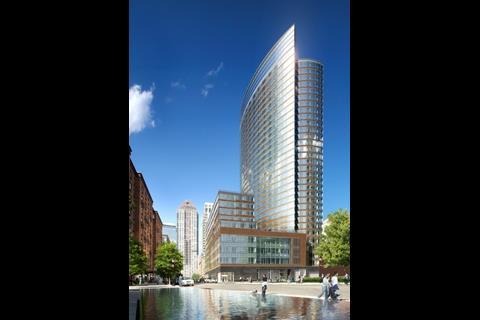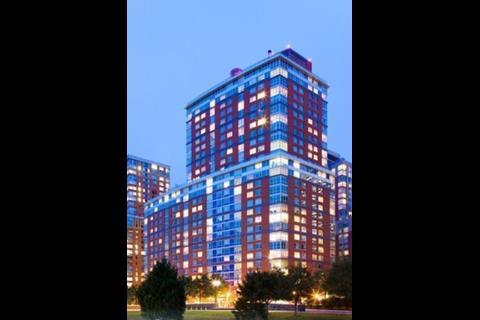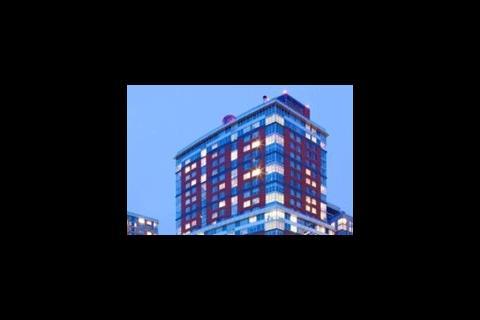Strict environmental planning rules at Battery Park City have produced a cluster of ever-greener residential towers
New York’s Battery Park City has strict planning guidelines that insist all new buildings must perform to well above the normal building codes when it comes to sustainability. The result is a group of residential towers that are getting ever more environmentally friendly and leading the way in green urban development in the US.
- The Visionaire should be the first residential block to be rated LEED Platinum
- Based on the Solaire building which is 35% more energy efficient than code requirements
- Residents at the Solaire save $1080 per year on their electricity bills
- A 500 mile resource limit has been imposed for 50% of building materials for the Visionaire
A green newcomer
Due for completion later this year, The Visionaire, a 35 storey residential block in Battery Park City, New York, is the latest addition to the city’s growing number of environmentally friendly housing developments.Designed by Pelli Clarke Pelli Architects for green development company, The Albanese Organisation, The Visionaire has been designed and engineered to qualify for the U.S. Green Building Council’s highest Platinum Leadership in Energy and Environmental Design (LEED) rating.
“At The Visionaire we’ve combined unprecedented green standards for filtered fresh air and water, energy efficiency and natural resource conservation with innovative design, high-end finishes and amenities and a remarkable location,” says Russell Albanese, president of The Albanese Organisation. “The end product will be an unmatched luxury residential building offering an exceptional living experience.”
The building is shaping up to be a striking, if slightly showy glass and terracotta tower featuring a unique curved façade that provides generous river views. It is predicted that it will be the first residential block to reach a LEED Platinum rating. However, the blueprint for its sustainable design is taken from a previous building by the Albanese Organisation that was completed over four years ago.

A built blueprint
The Solaire, a more conventional but no less environmentally pioneering residential block, was one of New York’s first sustainable housing developments. Also situated in Battery Park City, this 27 storey brick and stone clad apartment building has attained a LEED Gold rating and is claimed to be America’s first environmentally focussed residential tower.- The Solaire boasts impressive statistics such as:
- 35% more daylight to all living areas than required by NYC energy code requirements
- Appliances use 50% less water than codes require
- 60% of construction waste recycled
- 35% more energy efficient than code requirements, rising to 65% at peak demand
- All paints, adhesives, etc, are low volatile organic compounds (VOC)
- Onsite treatment and reuse of storm and waste water
- Heating, ventilating and air conditioning plant (HVAC) is 15% more energy efficient than conventional systems
- Photo-voltaics provide 5% of energy requirements
However, this list does not illustrate the dedication to sustainability that the building, its designers and managers exhibit. During construction materials were obtained from the closest possible supplier and where applicable from recycled or renewable sources. The resulting building features recycled wall and floor finishes, ranging from reconstituted cork and bamboo/plaster mix wall coverings to reformed stone and recycled carpet floor coverings. All finishes are also low VOC, meaning that they give off little or no harmful gases: this also applies to the cleaning products used everyday by the building management team.
Water use and quality is high on the agenda, especially as in New York buildings have to pay sewer charges to dispose of waste fluids. As a consequence, the Solaire has a vast plant room that houses treatment plant for both storm and waste water. Storm water is collected, cleaned and recycled for irrigation; while all waste from sinks, WCs, washing machines, etc – up to 25,000 gallons per day - goes through a seven tank purification system and is reused for flushing, the cooling towers and irrigation.

This purification system also saves energy as it greatly reduces requirements for pumping to City sewer treatment plants and it is just one of a range of energy reducing measures including centrally located, maximum efficiency heating, ventilation and air conditioning plant (a roof-mounted gas fired absorption chiller) that heats and cools water depending on climatic requirements.
Water use and quality is high on the agenda, especially as in New York buildings have to pay sewer charges to dispose of waste fluids
Energy is also generated via photo-voltaic arrays sited on the building façade, entrance canopy and roof, and sub-meters have been installed to enable the building to take advantage of off-site green energy generation in the near future. This all sounds very ‘green’ but to bring it down to hard facts, residents can expect to make considerable savings on their electricity bills: compared to a typical two bedroom apartment (average annual energy cost of $1825), a Solaire property offers annual savings of $1080 per year, some 59%.
The new vision
The Visionaire is taking on board all of the attributes and lessons learned from the Solaire. However, it is not something that your ‘average Joe’, working the subway or driving yellow cab could afford: studio apartments start at $600,000. For this outlay, residents in the concierge serviced block will get all the mod-cons plus environmental features such as rift-cut oak wood flooring harvested according to Forest Stewardship Council certified standards; kitchen cabinets built from renewable bamboo; an innovative high-efficiency air filtration system that conditions, filters and supplies fresh air into each apartment; and low-flush water-saving appliances throughout.Energy efficient measures will yield 35-40% more energy savings than code-compliant buildings. Similar to its predecessor, The Visionaire will harvest approximately 5% of its electric load through 48 kW of building-integrated solar panels. However, a further 35% of the building’s electric energy will be supplied through wind generated power. Natural gas will power the residential cooling systems and contribute to a substantially lower peak electric demand on New York City’s grid.
A water treatment system in the building will recycle water and provide make-up water for the HVAC system cooling tower. The building will also harvest rainwater and store 10,000 gallons of recycled water for irrigation of a rooftop garden.
Over 85% of construction waste materials are currently being collected and processed for recycling and all construction materials contain a minimum of 20% recycled content. Finally, a 500 mile resource limit has been imposed for 50% of building materials to minimise embodied energy and pollution.
Battery Park City is the domain of stockbrokers and ladies who carry dogs in handbags. However, the greening of New York’s new housing stock has to start somewhere and these examples of energy efficient, economically viable housing blocks should prompt others to consider building greener in the near future.

Visionaire project team
- Architect: Pelli Clarke Pelli
- Mechanical and electrical consultant: Cosentini Associates
- Structural engineer: DeSimone Consulting Engineers
- General contractor: Turner Construction Company
Solaire project team
- Design Architect: Cesar Pelli and Associates Architects
- Structural Consultant: The Cantor Seinuk Group
- Mechanical and electrical consultant: Cosentini Associates
- General Contractor: Turner Construction Company































No comments yet